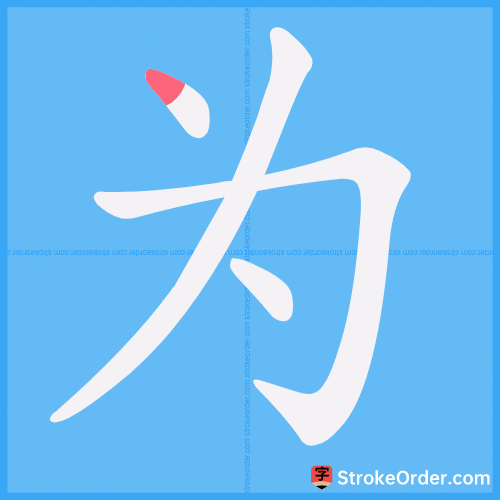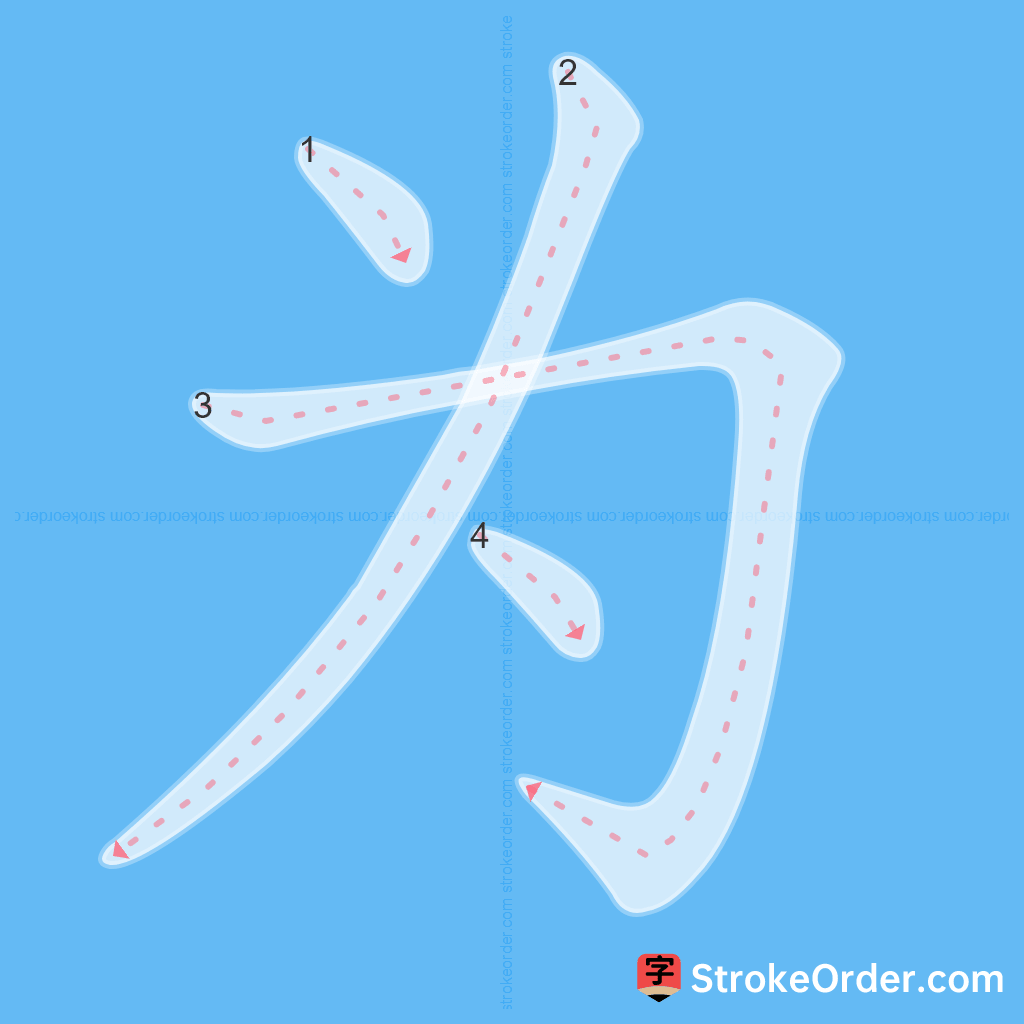为 Stroke Order
Animated Stroke Order of 为

Stroke Order Diagrams for 为

Step-by-Step Handwriting Guide for 为

Learn to Write Chinese Characters with Video Tutorials
Watch the video of writing the Chinese character "为", learn the correct stroke order (笔顺) of the character "为", and master the standard way of writing the character "为".
Free Printable Handwriting Practice with Stroke Order: 为
Printable Writing Practice Worksheet of "为" in Portrait Orientation (Tian Zi Ge)

Printable Writing Practice Worksheet of "为" in Landscape Orientation (Tian Zi Ge)

Information of 为
Pinyin
wèi、 wéi
Radical
丶
Strokes
4 strokes
Usage
★★★★★
Definition
act as / take...to be / to be / to do / to serve as / to become, because of / for / to
为
為、爲 wéi
动词
1. 做,行,做事 : do; act; work
2. 当做,认做 : take as; regard as
3. 变成 : become
4. 是 : be
5. 治理,处理 : administer; handle
6. 被 : by
7. 表示强调 : express emphasis
8. 助词,表示反诘或感叹 : particle indicating rhetorical question or exclamation
9. 姓 : surname
名词
姓 : surname
介词
1. 被 : by - introduces the agent of an action
2. 于,在 : in - indicates time or place
3. 和 : and - indicates conjunction
4. 则,就 : then - indicates consequence
5. 如,若 : if - indicates condition
6. 或,抑 : or - indicates choice
助词
1. 的,之 : of - used in noun phrases
2. 宾语前置的标志 : indicator of fronted object
3. 附于单音形容词后,表示程度、范围的加深或扩大 : indicating deepening or expansion following an adjective
4. 附于表示程度的单音副词后,加强语意 : emphasizes meaning following a degree adverb
5. 用于句尾,表示反诘、疑问,多与“何”相配合使用 : used at the end of a sentence to indicate a rhetorical question, often with "何"
6. 用于句尾,表示感叹 : used at the end of a sentence to express exclamation
为
為、爲 wèi
动词
1. (会意字。从爪象。甲金文像手牵象,会劳作意,本义是做事、作为) : (pictophonetic character; original meaning related to labor or action)
2. 假借为“伪” : borrowed as "false"; to do; act; make
3. 制作;创作 : to make; compose
4. 治理 : to administer
5. 变成,成为 : to become
6. 是 : to be
7. 学习,研究 : to study
8. 种植;营作 : to plant
9. 设置;建立 : to establish
10. 使 : to let
11. 以为;认为 : to think; believe; consider
12. 演奏 : to play
名词
姓 : surname
介词
1. 被 : by - indicates the doer of the action
2. 于,在 : in - indicates time/location
3. 和 : and - indicates parallel relationship
4. 则,就 : then - indicates consequence
5. 如,若 : if - indicates hypothetical relationship
6. 或,抑 : or - indicates choice
助词
1. 的,之 : of - used in noun phrases
2. 宾语前置的标志 : indicator of a fronted object
3. 附于单音形容词后,表示程度、范围的加深或扩大 : attached to monosyllabic adjectives to intensify meaning
4. 附于表示程度的单音副词后,加强语意 : attached to monosyllabic adverbs to reinforce meaning
5. 用于句尾,表示反诘、疑问,多与“何”相配合使用 : used at the end of sentences to indicate rhetorical questions, often with "何"
6. 用于句尾,表示感叹 : used at the end of sentences to express exclamation
替,给
1. 替,给 : for; on behalf of
2. 表目的 : indicate purpose
3. 对,向 : toward
4. 帮助,卫护 : help; protect
to see what is right and act courageously (idiom, from Analects); to stand up bravely for the truth / acting heroically in a just cause
turn waste into wealth / change waste material into things of value / recycle waste material / upcycle
lit. to exchange weapons of war for gifts of jade and silk (idiom) / fig. to turn hostility into friendship
Kang Youwei (1858-1927), Confucian intellectual, educator and would-be reformer, main leader of the failed reform movement of 1898
die for one's country / die for the sake of the country / lay down one's life for one's country
Input Method for 为
Pinyin
wei4
Wubi
ylyi|yeyi
Cangjie
iksi
Zhengma
udys
Four Corner
34027
Unicode
U+4e3a
Same Pronunciation Characters